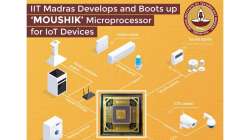IIT Madras introduces ;MOUSHIK' microprocessor for IoT products: Know details
IIT Madras's MOUSHIK project was funded by the Ministry of Electronics and Information Technology

The Indian Institute of Technology (IIT) Madras on Thursday said its researchers have successfully developed 'MOUSHIK', an indigenously-made microprocessor for the Internet of things (IoT) devices. According to the institute, 'MOUSHIK' is a processor cum a system-on-chip' that can cater to the rapidly-growing IoT devices, an integral part of smart cities of a digital India.
It was conceptualised, designed and developed at the Pratap Subrahmanyam Centre for Digital Intelligence and Secure Hardware Architecture (PS-CDISHA) of the RISE Group, Department of Computer Science and Engineering, IIT Madras.
"There are three steps involved in the making of a microprocessor, namely design, fabrication and post-silicon boot-up," Kamakoti Veezhinathan, Reconfigurable Intelligent Systems Engineering (RISE) Group, IIT Madras, said in a statement.
"All three processes for 'MOUSHIK' were undertaken in India, demonstrating an aAtmanirbhar' ecosystem in digital design productisation," Veezhinathan added.
The impact of the completely-indigenous development process is the showcasing of an Indian ecosystem for designing, developing and fabricating end-to-end systems within the country, leading to self-sufficiency.
According to the researchers, the design of the microprocessor, motherboard printed circuit board design, assembly and post-silicon boot-up were done at the campus. The field applications of 'MOUSHIK' include smart cards including credit cards, ID cards, debit cards, travel cards for metros and driving licenses, electronic voting machines (EVMs) and office management systems including attendance, surveillance cameras and safe locks.
It also includes personalised health management systems, consumer electronics including but not restricted to washing machines and water pump monitoring systems. The project was funded by the Ministry of Electronics and Information Technology.
Latest technology reviews, news and more

